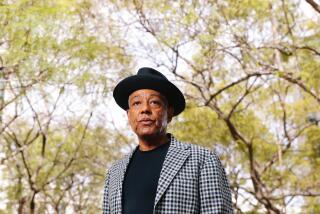For Kelsey Grammer, the comic roles were just a detour
It is a show business proverb that every clown wants to play Hamlet. But for Kelsey Grammer, the proverb is more complicated. Grammer, one of the most successful comic actors in television history, is starring in “Boss,” an eight-episode drama premiering on Starz on Oct. 21, in which he plays a declining Chicago mayor based on King Lear. He’s a Shakespearean who became a clown.
Grammer, who studied at the Juilliard School, got his first acting break when he was promoted from Lennox to Macbeth after the leading man quit a Broadway production. Then he spent 20 years as the orotund Frasier Crane. It was an unprecedented run in a comic role but stereotyped him as the fussy psychiatrist. Grammer tried reviving Macbeth on Broadway in 2001, but the New York Times dissed his performance as a “stodgy oratorical exercise.” The show lasted just 13 nights.
So when “Boss” creator Farhad Safinia approached Grammer with an idea for a TV series about a modern-day Lear, he was eager to try something Shakespearean again. “As skilled as he’s been at portraying this phenomenally famous comic character, that was actually a detour,” said Safinia, an Iranian-born Englishman who scripted Mel Gibson’s “Apocalypto.” “That was a 22-year, very lucrative, extremely successful detour from who he really is.”
“I like to do some different stuff,” Grammer said as he shrugged off his suspenders after a day of playing Mayor Tom Kane. “Hollywood doesn’t let you do that, so you’ve got to make it up yourself and get somebody to believe in it. It’s a departure, but in terms of a 35-year career which started in drama, it doesn’t really seem incongruous.”
Grammer’s character in “Boss” has been in power for 20 years. But he’s suffering from a degenerative brain disease and is forced to hide his frailty from his family and rival politicians plotting to move into his ornate office.
At 56, Grammer has certainly aged into a tragedian: He’s jowlier, balder, more lined. As his splayed stride carried him into a police station for the season’s climactic scene, he looked as weary as a real-life boss. With his name above the title, and his reputation as a serious actor on the line, Grammer has the same responsibility to “Boss” as a mayor to his city. Which is why, he said, he’s the man for the role.
“Mayor Kane is a force,” Grammer said. “He is a formidable man, a man of big shoulders. Chicago expects a certain personality in a mayor, a certain size, and that is something that we borrow from my own life in a way, because, you know, I’ve been on television a long time, and I’ve had some great success — a beloved character, all that kind of crap that comes along for the ride. I’m not sure you could play the role if you didn’t bring that cachet with you as an actor.”
Since taking over Starz in 2010, Chris Albrecht, former HBO original programming president, has worked to build a dramatic lineup rivaling his former employer’s. “Spartacus” and “Torchwood” were big productions with largely unknown actors; Grammer is the network’s first above-the-title name for a series.
“Kelsey is an enormous star for a television audience, so I think that will bring a lot of viewer interest,” Albrecht said. “It’s also a sign that this is a place where other A-list actors can do really good work and still support a career.”
While conceiving their main character, Safinia and Grammer thought of him only as a contemporary king, losing his powers. After considering a New York real estate tycoon and a Washington power broker, they decided on a Chicago mayor. Chicago politicians make great TV: a president (Barack Obama) whose career began with a prime-time convention speech, an ex-governor (Rod Blagojevich) who appeared on “Celebrity Apprentice,” a mayor (Rahm Emanuel) who inspired a “West Wing” character.
Safinia and Grammer maintain that the city’s insecure frontier culture produced the perfect historical and architectural setting for “Boss.”
“The people here … they had almost a chip on their shoulders, as though they want to feel better than New York, and the same reaching for the skies is manifested in their architecture and their politics,” Safinia said. “It’s also why they’re so interesting to look at in terms of corruption and race — the simultaneous existence of reaching for such great heights, and yet falling short. From an outsider’s perspective, the greatest American stories are about that.”
Grammer’s first big scene — a fatuous speech praising the governor he’s about to backstab — condenses the show’s promise and problems. Viewers will not think “Mayor Frasier”: Grammer captures the fear inside a man whose career depends on control yet is losing control of his body to a terminal disease. But despite filming in inner-city neighborhoods far from Wrigley Field, “Boss’” insight into Chicago and its politics feels paper-deep. Not even Emanuel could order City Council members to turn in their BlackBerrys to ensure a secret vote. Also, Kane is a WASP, a breed that disappeared from City Hall 100 years ago.
While in Chicago, Grammer dined with the outgoing mayor, Richard M. Daley, and the incoming mayor, Emanuel. Neither gave him ideas about playing a politician, he said, but they seem to have given him an idea for his next career if “Boss” isn’t renewed for the five-season, five-act run its creators envision. Grammer is an outspoken Republican who campaigned for John McCain and funded Rightnetwork, a conservative cable channel. (Grammer also played Georges in “La Cage Aux Folles” on Broadway, so mark him down as fiscally conservative, socially tolerant.)
After “Boss” wrapped, Grammer told the New York Post he plans to enter politics when his acting career is over. Which makes the fate of the series even more interesting.
If “Boss” carries on long enough, Grammer will continue acting his way through the 37 Plays. He still feels a need to prove himself as a Shakespearean, even if that means playing Mayor Tom Kane on Starz, rather than King Lear on Broadway.
“It might not be ‘King Lear’ next year,” he said. “It might be another [Shakespeare play]. We are borrowing liberally from a lot of stuff he had written and throwing in a dash of Jacobean, a bit of Grand Guignol.”
More to Read
The complete guide to home viewing
Get Screen Gab for everything about the TV shows and streaming movies everyone’s talking about.
You may occasionally receive promotional content from the Los Angeles Times.





